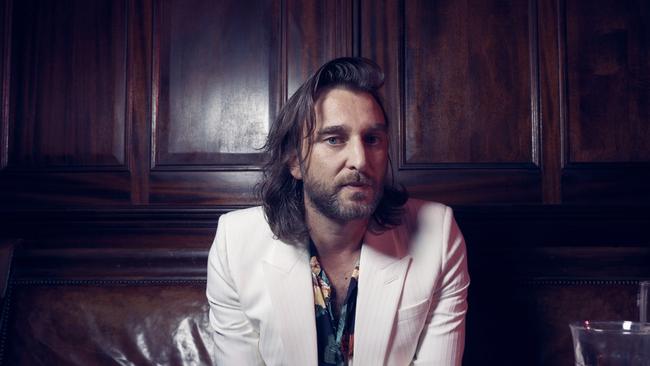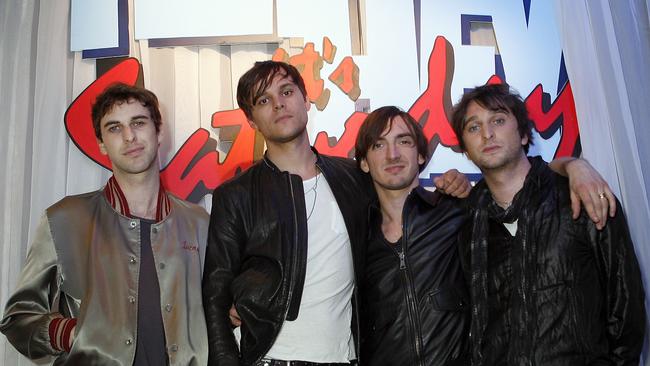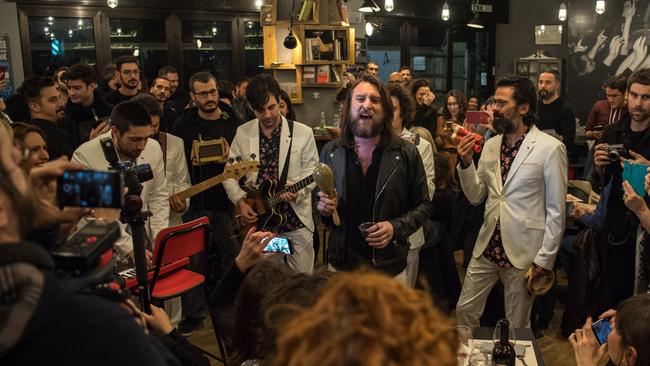Jet’s Nic Cester charts new course in Milan
From frontman of Jet, one of the biggest bands in the world, to the quiet life in Milan. What’s Nic Cester up to?

Inside a 660-year-old castle in the centre of Milan, a lean, bearded man walks out on stage wearing skinny jeans, an open-necked dress shirt, a black jacket and flowing long hair. When paired with his one-of-a-kind yowl, it’s a look that says: Rock star, all right. The bearded guy is Nic Cester, frontman of Jet, the Melbourne-born quartet that rocketed to global fame in 2003 off the back of Are You Gonna Be My Girl, one of the greatest earworm singles to emerge from our shores this side of The Easybeats.
Cester begins singing in English but two minutes into the opening number at Sforza Castle he addresses the crowd fluently in the local dialect, drawing cheers. Hardly a stranger in a strange land, he looks entirely comfortable up there with his Italian band Milano Elettrica, as though he’s playing to a home crowd. And funnily enough, he is.
That opening song is the title track from Cester’s soul-influenced debut solo album, Sugar Rush, which was released in 2017, more than eight years after the third and final Jet album. Compared with Jet’s debut album Get Born, which sold more than three and a half million copies worldwide at a time when CDs were still king, his debut solo album barely created a ripple.
Despite his Australian roots, Spotify reports that Cester’s solo output has the most ardent listeners overseas: his top five cities are London, Mexico City, Helsinki, Milan and Moscow. And while 100,000 monthly global listeners for his solo work on that music streaming service is nothing to be embarrassed about, it’s also a far cry from his heyday. Now largely inactive except for occasional tours – supporting Jimmy Barnes last year, a theatre tour in 2018 for the 15th anniversary of Get Born, supporting Bruce Springsteen in 2017 – Jet has a back catalogue that still attracts nearly four million monthly listeners on Spotify.
But here’s the thing: having lived through the head-spinning experience of sudden fame when Jet was plucked from the obscurity of a small Melbourne rock scene, Cester has little desire to repeat the process. Things have changed, and so has he. “Over here, my story is [considered] fascinating,” says the 41-year-old of the place he has called home for five years. “It’s pretty weird that a guy would walk away from this huge band. Everyone’s like, ‘Are you f..king crazy? Why are you in Italy? You were in Jet and you walked away from that – and now you’re here, doing this?’ People just don’t get it.”
Most bands live and die without knowing the feeling of a single song catching an updraft and soaring into the rarefied air of a global hit. With his younger brother Chris on drums and backing vocals, childhood friend Cameron Muncey on guitar and bassist Mark Wilson, Jet had such a moment with Are You Gonna Be My Girl, a raucous rock number that begins with the shake of a tambourine, plucked bass notes and a distinctive drumbeat before a few bent guitar strings and the singer’s righteous howl introduces the main motif.
The song was one of the tracks to feature in a global TV advertising campaign late in 2003 for the Apple iPod, where silhouetted figures danced against colourful backgrounds while wearing white earphones. “It was massive,” says Andy Cassell, who manages both Jet and Cester’s solo career. “It made a massive difference because the iPod was the coolest thing at the time. We didn’t realise how big it was until it happened, and we were seeing billboards everywhere. It really propelled that song around the world.”
Contrary to popular assumption, the band didn’t make much money from that song placement: the tech company even refused their requests for free iPods. Yet fuelled by Apple’s campaign, Jet truly took flight.

Prior to that, the frontman’s job after graduating from high school in 1997 was working at the poultry and game business owned by his father, John. The work was repetitive but Cester enjoyed being around his dad by day and playing music at night in the band he’d formed with Muncey. “My parents divorced, so I was living at mum’s place,” he says. “Dad would pick me up every morning in his car. I drove a forklift truck, and Chris was the delivery guy.” Music was a sideline until record label talent scouts began flying halfway around the world in search of the next band that sounded somewhat like Sydney act The Vines, whose 2002 debut album Highly Evolved had kicked off a garage rock revival across Britain and the US.
After a bidding war that saw Jet sign with Elektra Records they went to Los Angeles to record their debut album, only to head home halfway through to support the Rolling Stones on an Australian arena tour – as you do, if you’re the hottest rock band in the country.
For Cester, the switch from forklift driver to full-time celebrity rock’n’roller was swift. “It all happened so quickly that I didn’t realise how big we’d become until much after,” he says. “It was very much like being in the eye of the storm. It was a lot to wrap my head around.”
Released in September 2003 and largely comprising co-writes by the Cester brothers, Get Born – named for a line in Bob Dylan’s Subterranean Homesick Blues – was a hard-rocking album that pointed directly to the likes of You Am I, the Stones and AC/DC while also containing a few ballads and no shortage of its own unique strut and swing. “The most refreshing thing about the album is that Jet is free of the neurotic self-examination that passes for meaningful songwriting in the post-Nirvana era,” opined an entry in the 2010 book 100 Best Australian Albums. “This band is too busy being born to be busy crying.”
For the frontman, that 13-song collection was the start of something special, but the honeymoon didn’t last long. “There’s a short period where everything was going great, which is the Get Born period – and then my dad got sick,” says Cester. “We found out that he had cancer when we were on tour with Kings of Leon, which was one of the first ever American tours we did.”
John’s throat cancer was aggressive, and shortly before he died in August 2004 he insisted that his musical sons continue to do him and the family name proud by staying on the road to fulfil their commitments rather than rushing home. “It’s always been kind of hard for me to separate those two events in my life: the unhappiness of the passing of my father, and [how] the impact of that bled into the experience with Jet,” Cester says. “From that point on, it was as if there was a big cloud over the whole thing.” All this while in the thick of a relentless performance schedule that saw them playing festivals, headline shows and plum support gigs with the likes of Oasis.
At least one of Cester’s bandmates found him hard to read at the best of times. “Nic’s one of those guys that I feel like I’ve known for 20 years, but I’ve not known for 20 years, you know?” says bassist Mark Wilson. “He’s quite an insular guy. Obviously we’re friends and we have been for years, but I don’t really know much about what he’s thinking. He’s an interesting enigma of a fella.”
Although the band released two more albums after its debut, Shine On (2006) and Shaka Rock (2009), in hindsight the group had its commercial and perhaps creative peak at the beginning of its career. Jet never again produced something that captured the wider public imagination as did the lead single from Get Born.
While the death of his father cast a long shadow across 2004, Cester had another life-changing experience towards the end of that year. In October, Jet was headlining the Rock It festival in Perth when a bus carrying athletes for the National Netball Championships pulled into the same hotel. Pia McGeoch was partying in a hotel room one night after her team had won the tournament when she met the man who would become her husband and the father of their daughter. “Lots of people in that room were being very loud and in your face, and making themselves known,” says McGeoch of their first meeting. “Nic was really quiet and sitting in a corner, and he’s always impressed me in the sense that he doesn’t feel the need to – other than when he’s on stage – perform, ever. He’s very understated and humble, and doesn’t have to be anything he’s not. It wasn’t hard to fall in love with him.”
The pair made plans to reconnect in Melbourne soon after the Perth meeting, once Cester had returned from what he described as a short work trip to the US. While he was away she picked up a newspaper and saw a photo of him and the band on the front page, holding an MTV Video Music Award they’d won at an event in Miami. “To this day, it really sums up Nic,” laughs McGeoch. “He texted me when he got back, and I was like, ‘How was the trip?’ He said, ‘Yep, good.’”

Jet’s final live show was in late 2010, and following the band’s split in 2012 the couple looked for a change of scene. McGeoch had given up netball at the end of 2004 for a career in law, and Cester had been wrapped up in writing, recording and performing for nearly a decade. They retreated to Berlin for more than a year, where they took German lessons, lived frugally and explored the city. In time, Cester felt his passion for music return. “I started thinking, ‘Man, I will never really forgive myself if I don’t at least explore the possibility that music still has an important role to play in my life’,” he recalls. “So I booked three months of studio time [in Berlin] without a plan, and I’d show up three or four days a week.” Cester hadn’t picked up a guitar in about three years, and he describes that first month as the most excruciating musical period of his life as he struggled to rediscover his artistic voice. With just a bass guitar in hand at first, he began writing his way towards momentum, confidence, and what would eventually become his first solo album. “I think that added to the general feeling of us being happy and relaxed, because he’d felt so directionless for so long,” says McGeoch. “And when you’re directionless is when you start going out, having big nights and doing all the things that aren’t good for us. By being focused on something again, Nic also got really healthy. He looked so well: he was toned again, his hair was shiny; he looked like he was ready to take the chance to try music again.”

Their decision to move to Milan in 2015 was linked to the heritage of his Italian-born father. “I was very close with my dad – we celebrated his 40th birthday with my 18th – and when he died, incredibly suddenly, it tore my world apart,” he says. “I’ve sort of been on a pilgrimage ever since… all of a sudden my interest in my father’s history became immense. I never spoke Italian at home... so I wanted to move to Europe, learn the language and dig deeper into the culture.”
As the collection for his debut solo album took shape, Cester was careful to keep expectations modest and content to let his new work find its audience, comparatively small though it might be. “I’m not going to lie and say I’m not ambitious; I am,” he says. “But the goalposts had shifted, and what I call ‘success’ nowadays isn’t necessarily what it was when I was in Jet. I was aware that I’d been away for years, and this would be laying down the foundation for the next steps. But because I knew that I love doing music in this way, I was happy to play a long game.”
Aside from that unmistakeable voice at the centre of the mix, Sugar Rush bore little resemblance to anything Jet had released. “Was it a massive selling record? No,” says Michael Gudinski, whose label Bloodlines released the album in 2017 and plans to put out No. 2 next year. “But did we have enormous expectations? We did because of the quality – but not from a sales point of view. When you’re going into a solo thing, it takes time to develop. I believe the next record will do a lot better. We wouldn’t be continuing on if we thought it wasn’t going to go so well.”
In March this year, in an attempt to curb thespread of coronavirus, Italy became the first country to implement a nationwide lockdown. For two months a couple of creative projects occupied Cester in his family’s small apartment in Milan. First, he put out a call on social media to see if anyone would be up for recording themselves at home, playing and singing along to a couple of his songs, Eyes on the Horizon and Hard Times, while in lockdown. Responses poured in, a video-editor friend stitched it all together, and the result was a project Cester describes as the most humbling thing he’s ever been involved in. “There was no bullshit about it; there was no agenda,” he says. “I love music, and I stepped away from Jet for many reasons, but one of them was that I lost human connection with music along the way. Doing things like that [video] is important to me, because it firmly plants you back on the good side of things.”
With the global live music industry on an extended break due to the pandemic, Cester also remotely recorded vocal parts for a supergroup he’s involved with alongside members from multi- million-selling British bands Blur and Muse. Named the Jaded Hearts Club, it began as a Beatles covers band featuring Muse frontman Matt Bellamy, Blur guitarist Graham Coxon and Jet drummer Chris Cester, among others, before things got more serious when Paul McCartney himself got up to sing Helter Skelter at a gig one night in Los Angeles in 2018. From its Beatles-leaning origins, the band’s repertoire has since expanded to take in covers of classics from the British “northern soul” movement of the 1960s. “I was not really around in the beginning [of the Jaded Hearts Club] and now I’m more part of this incarnation,” Cester says. “But it’s constantly changing, and that’s part of the fun of it. There’ve been many members coming in and out, and I think that’s how it will always be.”
The lead single from the band’s upcoming debut album is a cover of the 1966 Four Tops hit Reach Out I’ll Be There, and for its music video, Cester is shown belting out the song – perfectly suited to his vocal register – from a Milan balcony into a courtyard while neighbours look on. It’s a friend’s apartment, not his, but the clip was intended as a tribute to the beautiful images of community that were seen around the world earlier this year as Italians took to singing en masse from their balconies during lockdown.
Fun though it is, the Jaded Hearts Club is a sideline next to the main event in Cester’s creative life – that second solo album. Recorded over a couple of weeks in June at a house in Tuscany, with his wife and their two-year-old daughter Matilda not far from his side, the singer-songwriter now feels as though he’s on a proper trajectory for this phase of his artistic life, having planted a flag in the ground with Sugar Rush three years ago.
Earlier, Cester had confided that the most enjoyable times in the whole Jet trip were pre-fame, when they were just four friends playing around their hometown, occasionally driving up to Sydney for a gig, constantly writing new song ideas. “It was pure,” he says of that time. “We had no idea what we were doing or where we were going. We were just having a great time. The only thing we were trying to do was impress the other guys in the rehearsal room, and that’s really the kind of feeling that I’ve worked hard to try and get back to ever since.”
Having spent most of the past 20 years trying to rediscover that place of wilfully naive purity, he is thrilled to have finally found it.
The Jaded Hearts Club’s debut album, You’ve Always Been Here, is released on October 2 via BMG. Cester’s second album is set for release in 2021 via Bloodlines.

